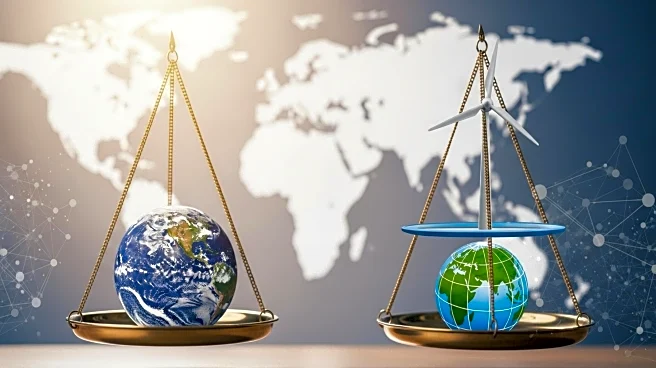What's Happening?
The European Union (EU) is currently experiencing significant internal challenges, with European Commission President Ursula von der Leyen facing criticism over a recent trade deal with the United States. The deal, which was announced at President Trump's Turnberry golf course, involves the EU eliminating tariffs on many U.S. goods while accepting higher duties on its own products, including a 50% tariff on steel. Additionally, the EU has committed to purchasing $750 billion worth of U.S. liquified natural gas, oil, and nuclear products by 2028. This agreement has been perceived negatively by many within the EU, with a recent poll indicating that 52% of respondents in the EU's five largest member states view the deal as a 'humiliation.' Furthermore, the EU is facing internal divisions over climate change targets, with member states delaying the approval of new goals. These developments have led to increased scrutiny of von der Leyen's leadership and the EU's geopolitical strategy.
Why It's Important?
The criticism of the trade deal and the delay in climate change targets highlight the EU's current geopolitical and internal challenges. The trade agreement with the U.S. has been seen as a concession that undermines the EU's economic interests, potentially affecting industries reliant on steel and other products subject to higher tariffs. The commitment to purchase significant amounts of U.S. energy products also raises questions about the EU's energy independence and its climate goals. The internal divisions over climate targets reflect broader disagreements within the EU on how to address global warming, which could impact the EU's ability to lead on environmental issues. These challenges could weaken the EU's position on the global stage and affect its ability to negotiate future trade deals and climate agreements.
What's Next?
The European Commission may face motions of censure from both the far-right and radical left groups within the European Parliament, although these are unlikely to succeed without support from pro-EU groups. The EU will need to address the internal divisions over climate targets and work towards a consensus to maintain its leadership on environmental issues. Additionally, the EU may need to reassess its trade strategy and energy policies to ensure they align with its long-term geopolitical and economic goals. The outcome of these challenges will have significant implications for the EU's future direction and its role in global affairs.
Beyond the Headlines
The current situation underscores the EU's struggle to balance economic interests with geopolitical ambitions. The trade deal with the U.S. and the internal divisions over climate goals reflect broader tensions within the EU about its identity and role in the world. These challenges may prompt a reevaluation of the EU's strategic priorities and its approach to international relations. The EU's ability to navigate these issues will be crucial in determining its future influence and effectiveness as a global actor.








